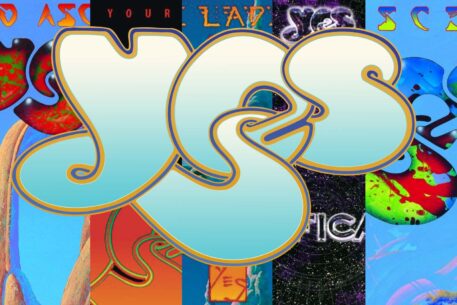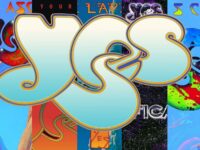John M. Gouldin is breaking down five less-heralded albums Yes released between 1996-2001 in a multi-part series, beginning with ‘Keys to Ascension’ and continuing now with ‘The Ladder’:

The five young aspiring musicians simply wanted a short name that would appear large on posters. They did not know they were forging a machine that would last past themselves.
Yes has a 50-year pedigree of diverse music spread across six decades. Started during the hippie aesthetics of 1968, it has outlived the Walkman 2, MTV, Napster, and the iPod, and now lives in the age of personal playlists. While their reputation is most strongly tied to progressive rock, the majority of Yes studio works fall into the genres of rock and pop, and contain some of the band’s best music. A few Yes albums have attained legendary status. The majority are worthy listening.
Necessity, circumstance and chance have all impacted YesHistory, sometimes with a Lewis Carroll quality attached. Little about this iconoclastic organization can be explained in a simple declarative sentence. In its circuitous road, Yes has more than once entered a phase of inertial uncertainty only to emerge not just alive, but stronger and musically enriched.
This appeared to be the case in November 1998. An attempted reunification of the 1970s most productive progressive-era lineup resulted in a pair of albums of live and studio music, Keys to Ascension and Keys to Ascension 2, that became instantly orphaned as the lineup suddenly faltered. In quick reaction, the remaining lineup added a new contributor and put out a rock/pop album, Open Your Eyes, that still divides fans today.
Established members Chris Squire, Jon Anderson, Alan White and Steve Howe, with new addition Billy Sherwood, finished the year-long Open Your Eyes tour motivated to head directly into the recording studio. Before doing so, they made the consequential move of adding a second new member, becoming a six-piece outfit for the first time.
Talented and effusive Igor Khoroshev integrated into Yes as sideman throughout the lengthy tour. Raised on smuggled American rock while being educated behind the Soviet-era Iron Curtain, he brought a conspicuous ability to the position reminiscent of Wakeman or Pat Moraz, capable of rock or elegance as needed, and quickly turned into a favorite of Yes fans.
Momentum continued as good choices were made. Selecting an ace producer, Yes also elected to create communally versus remotely and to accept input from old and new members with equal weight, as reflected in the unusual equalized writing credits.
What came from these choices is a smartly conceived and exuberantly delivered album that repeats no criticisms of Open Your Eyes, but more importantly, advances its own number of goals. Sharp and modern, self-referential as inspiration, it was exactly the type of record Yes – and most vocally, Jon Anderson – wanted as a capstone of the 20th century.
‘THE LADDER’
Released: September 1999
Players: Jon Anderson, Alan White, Steve Howe, Chris Squire, Billy Sherwood, Igor Khoroshev
Producer: Bruce Fairbairn
For their 19 studio album, this new-model Yes tacitly balances heritage, its view of modernity circa ’99, and mild exploration in a confident, hip package that captures the lightning of the moment. Among other things, The Ladder is a recalibration, delivering a fueled and animated retake on the progressive style of Keys to Ascension and the rock of Open Your Eyes, sounding focused and empowered. If looking at Open Your Eyes as a fair first album by a quasi-new band, this second try is a steroidal boost.
Early sequencing answers questions about inclusion: “Homeworld” was nine minutes of prog that will one day be an anthem for some off-planet city, while pointedly offering a progressive opening statement wholly absent from Open Your Eyes – and, intentionally or not, in a less formalized presentation than Keys to Ascension. This LP has aged into a neo-classic within fan circles due to its jammy discipline, perfect subject matter, and the inclusion of what is now Anderson’s last great Yes coda.
Terrestrial, radiant pop homage “It Will Be a Good Day” then claims opposite territory, perhaps to show nothing will be left unattended this time. Borders set, a sort of party begins thereafter and from Yes, a new, unanticipated, inviting and intelligent warm-weather vibe.
The core is adult up-tempo rock, but other styles decorate the edges. Light effects from Caribbean, reggae and other world music, never intrusive, serve as inspiration or color – a Yes first courtesy of Alan White and Jon Anderson’s ongoing interest. Delegated single “Lightning Strikes” didn’t rise in the charts but represents this new palm-tree muscle with a tune that would be a nice fit on any party-barge or beach.
This groove peaks with the arms-up “To Be Alive,” allowing the last third of The Ladder to open and get tougher. Toward the end, Igor Khoroshev fiercely decorates final blast, “New Language,” another prog-tickled stretch that, like the rest of the album, successfully twines many threads – old with new, traditional with current.
Egalitarianism paid off, and the qualities of this singular entry in the disparate Yes catalog are easy to hear today. Khoroshev’s breadth and taste along with Billy Sherwood’s vocals and instrumental abilities force-multiplied an already formidable core into a unit exuding a good deal of plain old musical excitement as the song selection courses to a satisfying end.
A fair portion of The Ladder’s success should be attributed to a reinvigorated band spirit. Yes has always made strong use of new talent and enthusiasm, and this instance is no different. This musical chameleon made good decisions and took best advantage of necessitated changes occurring after the Keys to Ascension reformation went south, and the music reflects this upswing.
Confidently playing several new cuts, a powered-up sextet took the stage across Latin and North America during the last few months of 1999, and then Europe until March 2000. The video House of Yes: Live at the House of Blues is a volume up, lights-down viewing capturing the power of this unusual array as they performed for an enthusiastic Halloween audience.
The video would be released after heavy changes yet again impacted the band. At the end of the short tour, a stunning choice was made: Yes and Billy Sherwood parted ways.
In standard fashion, the separation was business-class congenial and he would return, as to a private fishing hole, in 2015. Reasons given came down to a proposed tour later in the year of exclusively ’70s long-form epics such as “Ritual” and “Gates of Delirium.” As such, the set-list would be a host of songs created with no rhythm guitar parts or other “place” to put his abilities.
It seemed an odd move. The deed done, Sherwood moved on with a fulsome career while Yes, pared to its most common configuration, prepared for a summer Masterworks Tour with opening band Kansas. It must have been apparent that this would showcase very popular old pieces but then also suspend any momentum recently gained from the newer music of the last couple years.
Keys to Ascension resulted in musical fruit grown from a determinate plant. Now it seemed the proceeds of both Open Your Eyes and The Ladder would be swiftly, intentionally put aside as well. There had been four diverse albums in as many years and this dynamic, inventive phase of YesHistory was not over: The next year would again be evolutionary.
Once more, choices and mere circumstance would take Yes down an unanticipated musical rabbit hole to a place entirely different than immediately before. As this six-year string of creativity wound out to its last stage, events would again prove that little about the Gordian knot history of this band unraveled without intervention by the Fates.
Click here for John M. Gouldin’s four-part series on one of Yes’ most overlooked eras, with thoughts on ‘Keys to Ascension and Keys to Ascension 2,’ ‘Open Your Eyes,’ ‘The Ladder’ and ‘Magnification.’
- The Story of the Only Yes EP: ‘From a Page’ - August 18, 2023
- New Yes History: A Moment to Breathe, A Moment to Listen - May 15, 2023
- Returning to One of Yes’ Most Overlooked Eras: ‘Magnification’ - February 13, 2023


